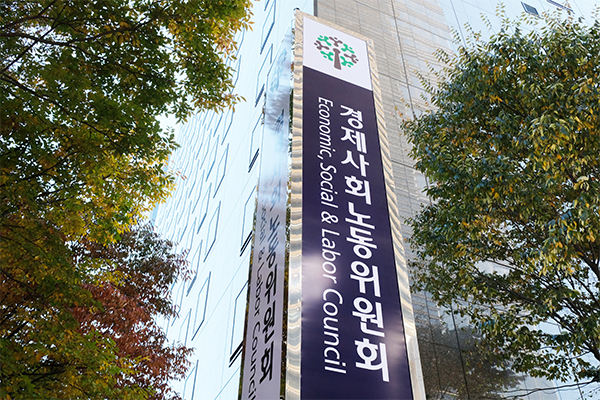
The Economic, Social and Labor Council(ESLC), a new social dialogue body in Korea, is likely to launch without the participation of the Korean Confederation of Trade Unions(KCTU) within this year.
KCTU takes a position that they need more time until its annual congress in January next year where the decision will be made for the participation in the ESLC. However, the mainstream opinion seems to tilt toward the possibility that the ESLC's official launching will take place within this year, as the Federation of Korean Trade Unions(FKTU) is strongly demanding the launch without further delay and the government also seems to have decided the timeline of the launching within this year. The Act on the Economic, The burden for not implementing any follow-ups even after the passage of the Act on the Economic, Social and Labor Council and the pressure from part of the public opinion critical of "indefinite delay" seemed to have affected the official launching of the ESLC without the participation of the KCTU within this year.
According to the tripartite member organizations on October 30, the participating member organizations attending the Tripartite Top Representatives Meeting will be holding a working party meeting on November 2 to fix a schedule for the 5th Tripartite Top Representatives Meeting which will make the final decision about the ESLC's official launching.
ESLC Chairman Moon Sung-hyun hinted the possibility of the ESLC's official launching within this year in a press briefing held on October 30 at the ESLC's office, saying that "The decision will be made through the discussion of the participating member organizations, but the general opinion among the participating organizations seems that now is not the time that (KCTU's participation) is an absolute requirement for the sake of the ESLC's official launching."
ESLC Chairman Moon expressed his views that regardless of the KCTU's participation in the ESLC, doors should be open to enable the KCTU to attend the meetings of the agenda-based, industry-based and special committees. He said that "If the KCTU wishes the attendance to the meetings and other participating organizations understand it, opportunities ought to be duly given." An ESLC official further explained that "Even though the KCTU became unable to participate in the plenary meeting of the ESLC due to internal organizational matters, considerations must be taken for the contributions the KCTU had made in the process of designing a new social dialogue body."
In fact, a "special committee for the national pension reforms and old-age income security" was kicked off on October 30 to discuss the institutional reforms of the national pension and the measures to strengthen the public pensions. Considering the very beginning of a social dialogue on the institutional reforms of the national pension which has recently raised public interest, a possible case of the KCTU's nonattendance whether it is decided by its own choice or by the outside factors will raise the possibility of controversy on the social legitimacy and representation regarding the bill to be proposed by the committee hereafter.
The ESLC plans to make every possible effort to realize the KCTU's participation in the social dialogue body, even if the official opening of the ESLC's plenary meeting will be held without the KCTU's attendance. It is also confirmed that KCTU President Kim Myung-hwan has shown his strong commitment to the participation in the ESLC.
However, KCTU President Kim's commitment to the participation in the social dialogue is one thing and the government labor policy change increasingly leaning toward the market taking into account the sluggish economic growth and aggravating employment index which further narrows the passage for the KCTU to the ESLC is another. The recent poor labor market performance and the income-led growth policy have been under the severe criticism by the conservative opposition parties and the press. The iconic labor policies of the minimum wage hike and the reduction of working hours to 52 hours a week(including 12 extended hours of work) have shown some significant setbacks. Following the expansion of wage components in calculating the minimum wage, the government and ruling party are now looking into various measures which can incapacitate the effect of working hour reduction policy like a measure to allow the expansion of the unit period of flexible working hours.
When the decision to expand the wage components of the minimum wage was made by the National Assembly in early this year, KCTU declared its nonattendance to the Tripartite Top Representatives Meeting. This time it would be the issue of the expansion of the unit period of flexible working hours that may impede KCTU's participation in the social dialogue.
reported by Bae Hye-jung
translated by Kim Sung-jin

